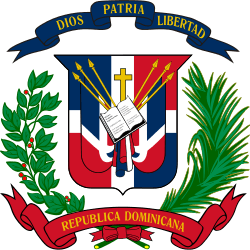Dominican Republic–United States relations
 |
|
Dominican Republic |
United States |
|---|---|
Dominican Republic – United States relations are bilateral relations between the Dominican Republic and the United States.
According to the 2012 U.S. Global Leadership Report, 57% of Dominicans approve of U.S. leadership, with 8% disapproving and 35% uncertain, the third highest rating for any surveyed country in the Americas.[1]
History
The U.S. has a strong interest in a democratic, stable, and economically healthy Dominican Republic. The country's standing as the largest Caribbean economy, second-largest country in terms of population and land mass, with large bilateral trade with the United States, and its proximity to the United States and other smaller Caribbean nations make the Dominican Republic an important partner in hemispheric affairs. The Embassy estimates that 100,000 U.S. citizens live in the Dominican Republic; many are dual nationals. An important element of the relationship between the two countries is the fact that more than 1 million individuals of Dominican origin reside in the United States, most of them in the metropolitan Northeast and some in Florida.
U.S. relations with the Dominican Republic are excellent, and the U.S. has been an outspoken supporter of that country's democratic and economic development. The Dominican government has been supportive of many U.S. initiatives in the United Nations and related agencies. The two governments cooperate in the fight against the traffic in illegal substances. The Dominican Republic has worked closely with U.S. law enforcement officials on issues such as the extradition of fugitives and measures to hinder illegal migration.
The United States supports the Leonel Fernández administration's efforts to improve Dominican competitiveness, to attract foreign private investment, to fight corruption, and to modernize the tax system. Bilateral trade is important to both countries. U.S. firms, mostly manufacturers of apparel, footwear, and light electronics, as well as U.S. energy companies, account for much of the foreign private investment in the Dominican Republic.
Exports from the United States, including those from Puerto Rico and the U.S. Virgin Islands, to the Dominican Republic in 2005 totaled US$5.3 billion, up 11% from the previous year. The Dominican Republic exported $4.5 billion to the United States in 2006, equaling some 75% of its export revenues. The Dominican Republic is the 47th-largest commercial partner of the U.S. The U.S. Embassy works closely with U.S. business firms and Dominican trade groups, both of which can take advantage of the new opportunities in this growing market. At the same time, the Embassy is working with the Dominican government to resolve a range of ongoing commercial and investment disputes.
The Embassy counsels U.S. firms through its Country Commercial Guide and informally via meetings with business persons planning to invest or already investing in the Dominican Republic. This is a challenging business environment for U.S. firms, especially for medium to smaller sized businesses.
The U.S. Agency for International Development (USAID) mission is focused on improving access of underserved populations to quality health care and combating HIV/AIDS and tuberculosis (TB), promoting economic growth through policy reform, support for CAFTA-DR implementation, and technical assistance to small producers and tourism groups; environmental protection and policy reform initiatives; improved access to quality primary, public education and assistance to at-risk youth; a model rural electrification program; and improving participation in democratic processes, while strengthening the judiciary and combating corruption across all sectors.
Principal U.S. officials include:
- Ambassador--Raul Yzaguirre
- Deputy Chief of Mission—Christopher Lambert
- USAID Mission Director—James Watson, Acting
- Consul General—William Weissman
- Economic and Political Counselor—Alexander Marguiles
- Public Affairs Adviser—Todd Haskell
- Commercial Counselor (DOC/FCS)--Robert O. Jones
- Defense Attaché—Lt. Col. David M. O'Connell (U.S. Marine Corps)
The U.S. Embassy is located in Santo Domingo.
See also
- Dominican American
- Foreign relations of the United States
- Foreign relations of the Dominican Republic
External links
References
![]() This article incorporates public domain material from websites or documents of the United States Department of State (Background Notes).
This article incorporates public domain material from websites or documents of the United States Department of State (Background Notes).
| |||||||||||||

.svg.png)